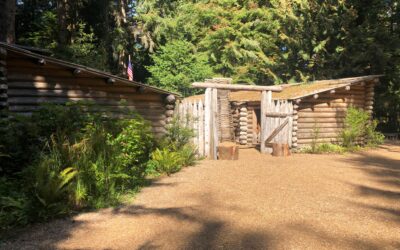Because of an upcoming trip to Oregon, I pulled The Journals of Lewis and Clark off one of my bookshelves with the idea of leafing through it and reading a few selected passages. I’m 180 pages into it now and showing no signs of stopping, even though I’ve already read it at least once years ago.
For those who aren’t used to getting sucked into a book that way, suffice it to say this is a lot clicking on a YouTube link to a short video and suddenly finding that you’ve killed most of the morning.
This is more than that, though. From a 21st century perspective, it’s difficult not to be impressed with the enormity of what Meriwether Lewis, William Clark and their Corps of Discovery did. After you spend a few logbook weeks with them, you realize that it’s a mistake to summarize what they went through with a few lines about an “expedition” that Thomas Jefferson commissioned to map and explore new territory in the West.
Their 2 ½ year journey (May 14, 1804, to September 25, 1806) from Camp Dubois, Illinois to Astoria, Oregon, and back was brutal beyond the quick take difficulty we can all imagine of scaling and crossing the Rocky Mountains on foot and in canoes, without a GPS or even a reliable map. Less than 200 pages into a nearly 500-page condensation of their journals, the two explorers and their men have probably come close to death in grizzly bear attacks a couple of dozen times.
Still, it’s the everyday trials and tribulations that make an impression on a tenderfoot from the 21st century; this entry (the misspellings and lack of punctuation is part of the experience) from Lewis on Monday, June 3, 1805:
“Those who have remained at camp today have been busily engaged in dressing skins for cloathing, not withstanding that many of them have their feet so mangled and bruised with the stones and rough ground over which they passed barefoot, that they can scarcely walk or stand; at least it is with great pain they do either, for some days past they were unable to wear their mockersons.”
On another occasion, he had written about the men having to escape from an angry bear over ground that was covered with prickly pear, and how the needles from the cactus easily penetrated those same moccasins. Think about that the next time you complain about the torture received from a pair of ill-fitting jogging shoes.
Even the most mundane inconvenience could be difficult, as Lewis writes in another entry from near Great Falls (Montana) on Friday, July 12, 1805:
“Mosquitos extremely troublesome to me today nor is a large knat less troublesome which does not sting, but attacks the eye in swarms and compells us to brush them off or have our eyes filled with them.”
Eyes filled with gnats? Well, there are worse things.
Lewis again, this time on Saturday, July 25, 1805, near the three forks that are considered the birthplace of the Missouri River:
“Capt. Clark arrived very sick with a high fever on him and much fatigued and exhausted. He informed me that he was very sick all last night had a high fever and frequent chills & constant aking pains in all his muscles, this morning not withstanding his indisposition he pursued his intended rout to the middle fork about 8 miles and finding no Indians rested about an hour and came down to the middle fork to this place. Capt. C. thought himself somewhat bilious and had not had a passage for several days.”
A short blog can’t do a nearly 500-page book justice, but a sample of the stuff that these guys endured seemed worth sharing. If you read it all, it’s safe to say that you’ll never think of the Lewis and Clark expedition the same mundane way again.



